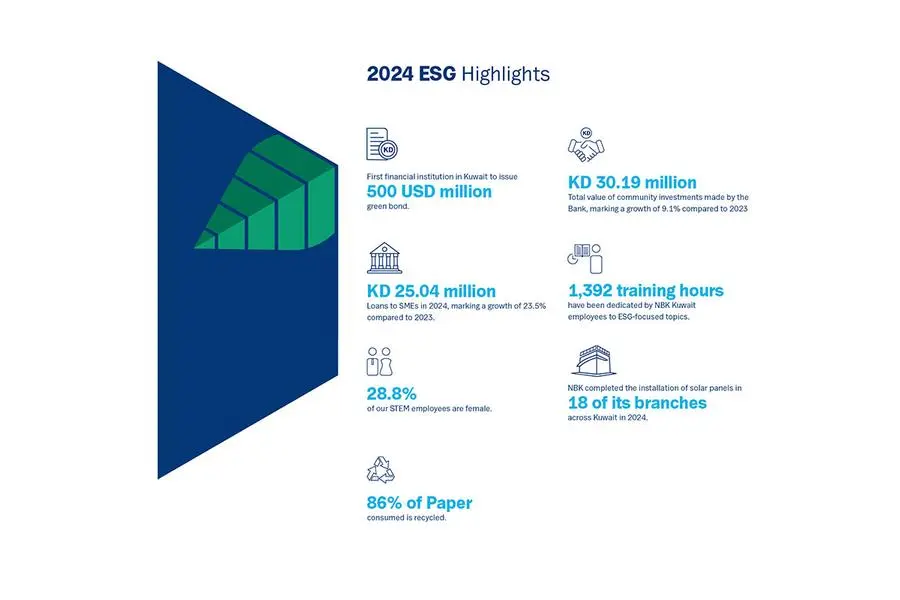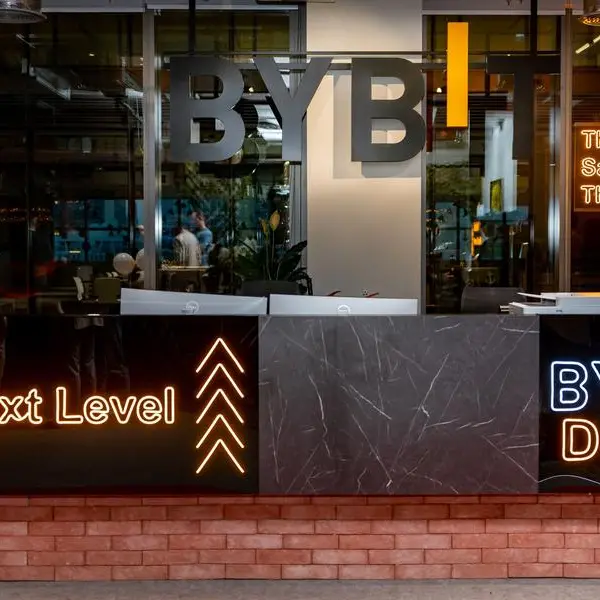PHOTO
- NBK becomes Kuwait’s first bank to join the PCAF initiative, pioneering efforts to curb greenhouse gas emissions
- First financial institution in Kuwait to issue $500 million green bond, reinforcing sustainability leadership
- NBK is in the process of developing a group-wide environmental and social risk management framework to strengthen ESG integration
- The bank expanded sustainable financing solutions, empowering clients to transition to greener business models
- Launched a comprehensive sustainable procurement strategy framework to address environmental, social, and economic impacts across the supply chain
- Institutionalized alignment with the recommendations of the Task Force for Climate-related Financial Disclosures (TCFD)
- Strengthened participation in global sustainability initiatives, including COP29 and COP16, to advance Kuwait’s vision for sustainability and drive action against climate change.
- Championed equal opportunities in the workplace by implementing the Bank’s diversity, equity, and inclusion (DE&I) statement
NBK's Achievements and Recognitions in 2024:
- Isam Al-Sager ranked first in Kuwait and third in the Middle East’s banking and financial services sector on Forbes' 2024 Sustainability Leaders list
- NBK was named the Best Bank in the Middle East for ESG-Related Loans Award 2024 by Global Finance
- Recognized as the Best Bank for SMEs in Kuwait by Euromoney
- Honored by Euromoney as the “Best Bank for Diversity and Inclusion in Kuwait” for the “NBK RISE” Program
- The only bank in Kuwait to earn a designation from CDP for the second year in a row, cementing its role as responsible leader in the banking industry
- Sustainalytics assigned NBK a “27.1” Medium Risk ESG Rating
- S&P Global recognized NBK’s significant progress with an improved CSA score of 39/100, marking an almost 9-point increase
- MSCI reaffirmed the bank’s sustainability performance with a “BBB” rating
NBK remains unwavering in its commitment to embedding sustainability at the core of its business, operations, and corporate culture, driving forward a vision of sustainable growth that aligns with the highest global standards.
In 2024, the bank achieved significant milestones in executing its ESG strategy, demonstrating notable progress toward a sustainable future through a range of innovative initiatives, practices, and solutions.
Amid the escalating global challenges posed by climate change, the Bank has introduced a series of initiatives in 2024 focused on mitigating its impact, accelerating the shift to a low-carbon economy, advancing green projects, and bolstering economic resilience against environmental crises.
Moreover, NBK Group continues to prioritize diversity, equality, and inclusion throughout its operations, while creating value for stakeholders and empowering communities in the markets it serves by ensuring banking services are accessible to everyone.
In 2024, NBK achieved significant progress across the four pillars of its ESG strategy—Governance for Resilience, Responsible Banking, Capitalizing on our Capabilities, and Investing in our Communities. This advancement underscores NBK's leadership in shaping a better, more sustainable, and prosperous future for all.
Governance For Resilience
Under the pillar of Governance for Resilience, NBK has reached several key milestones in advancing its ESG strategy in 2024.
As a trailblazer in sustainability, NBK became the first bank in Kuwait and the sixth bank in the Middle East and North Africa (Mena) to join the Partnership for Carbon Accounting Financials (PCAF) initiative. Joining this initiative puts NBK alongside the world’s leading financial institutions in measuring and managing greenhouse gas emissions linked to their lending and investment portfolios.
The PCAF initiative seeks to support financial institutions in their efforts to reduce greenhouse gas emissions by offering methodologies for measuring and disclosing emissions linked to various asset classes within their lending and investment portfolios. These asset classes include listed equity and corporate bonds, business loans and unlisted equity, project finance, commercial real estate, mortgages, motor vehicle loans, and sovereign debt.
This significant step reinforces NBK's commitment to sustainability and its goal of achieving carbon neutrality by 2060. It also supports the bank's efforts to enhance the measurement and disclosure of greenhouse gas intensity in its customers' activities, facilitating efforts to reduce carbon footprints and promoting the transition to a low-carbon economy.
The PCAF initiative is a crucial component of NBK's risk management framework, strengthening the bank's capacity to consistently assess carbon intensity and emission concentrations within its lending and investment portfolios. It also enhances NBK's ability to evaluate and manage climate-related risks and opportunities effectively.
The Bank also remained committed to the principles of the United Nations Global Compact (UNGC), having joined its ranks in 2023. Notably, in 2024, NBK submitted its first Communication on Progress, further demonstrating its commitment to transparency and responsible growth. As the largest corporate sustainability initiative for responsible business practices, the UNGC underscores NBK's dedication to supporting practices that drive the sustainable development of Kuwait’s economy.
The charter, which brings together more than 25,000 companies and nearly 3,000 non-commercial entities in 167 countries around the world, is an important opportunity to collaborate with companies and organizations with a common vision and share best practices and ideas on how to make a positive impact on society and the environment.
In the meantime, NBK has enhanced its capabilities to address economic, environmental, and social risks across all segments of the Group, while establishing a strong and effective ESG governance framework both in Kuwait and internationally. The bank has also integrated climate change risks into Pillar II of the Internal Capital Adequacy Assessment Process (ICAAP).
In 2024, NBK institutionalized the alignment of its standards with the recommendations of the Task Force on Climate-Related Financial Disclosures (TCFD), a framework designed to help companies address the increasing demand for transparency regarding climate-related risks and opportunities. The bank also developed a comprehensive, Group-wide environmental and social risk management framework.
Responsible Banking
As part of its responsible banking efforts, the second pillar of NBK's ESG strategy, the bank successfully issued its inaugural $500 million green bond in 2024. This issuance, part of its global medium-term securities program, has a 6-year maturity and first call date after 5-years.
This landmark transaction marks the first green bond issuance by a Kuwaiti financial institution. It also stands as one of the largest green issues by a conventional financial institution in the region and represents the first green bond issuance by a bank in the Middle East in 2024.
Throughout 2024, NBK remained at the forefront of sustainable finance, offering tailored financing solutions and supporting customers in adopting sustainable business models. The bank capitalized on the growing trend towards sustainable finance by launching a range of green transformation services and products across the Group, including green mortgage loans, sustainability-related financing, low-emission housing loans, and reduced interest rates on loans for electric and hybrid vehicles.
The Bank has also introduced a Sustainable Procurement Strategy Framework, a comprehensive approach to sourcing products, services, and goods. This strategy considers the environmental, social, and economic impacts across the entire supply chain, ensuring that procurement decisions not only meet immediate needs but also align with broader sustainability objectives.
To accelerate the transformation of its branch network into an environmentally friendly and energy-efficient operation, NBK completed the installation of solar panels in 18 of its branches across Kuwait in 2024. This initiative is part of the bank’s commitment to reducing carbon emissions and supporting Kuwait’s sustainability goals in alignment with Vision 2035.
This initiative reaffirms the bank's commitment to its interim goal of reducing total operating emissions by 25% by 2025, as part of its broader objective to achieve carbon neutrality by 2060.
Capitalizing on Our Capabilities
As part of its tangible efforts to enhance sustainability, NBK Kuwait employees received a total of 1,392 training hours dedicated to ESG topics in 2024, with a focus on sustainability awareness, sustainable finance, and climate risk management.
NBK continues to promote equal opportunities as it finalizes its Diversity, Equity, and Inclusion (DE&I) strategy and implements its supporting statement.
The bank implemented several strategic initiatives and specialized programs provided by the Bank to support and develop women leaders, which helped increase the number of women holding leadership and supervisory positions at all levels of the Bank.
NBK takes pride in being the workplace of choice that supports equal opportunities for both male and female employees. There are 347 professionals in science, technology, engineering, and mathematics (STEM) working in NBK, with women representing 28.8% of this workforce.
Investing in Our Communities
NBK is dedicated to leaving a lasting social impact and creating value in the communities where it operates through its community investments. The bank strives to provide the best service to its customers, safeguard their interests, and protect their rights, while also promoting financial inclusion, enhancing access to financial services, and improving financial literacy.
Consolidating its leadership as the largest contributor to social responsibility in Kuwait, the total value of community investments made by the bank reached KD 30.19 million in 2024, marking a growth of 9.1% compared to 2023.
NBK is also committed to contributing KD 8 million to the redevelop Sharq area, with new parking facilities and enhanced green spaces, in addition to donating KD 3 million for the development and beautification of Shuwaikh Beach. These initiatives underscore the bank's commitment to supporting the sustainable development of Kuwait’s economy and aligning with the nation's development vision.
In support of entrepreneurs in Kuwait, NBK provided loans to SMEs in 2024 totaling KD 25.04 million, marking a growth of 23.5% compared to 2023.
Additionally, as part of its ongoing commitment to societal development, particularly in the field of education, NBK continued to provide comprehensive support for the advancement of this sector. The Bankee program, one of the bank's most prominent initiatives aimed at enhancing financial literacy and awareness among school students in Kuwait, continued its activities for the second academic year. During the 2024-2025 academic year, the program reached 61 schools, 7,335 teachers, and 32,235 students, building on the remarkable success achieved in the previous year.
Moreover, as part of its commitment to environmental stewardship and responsible waste management, NBK successfully recycled approximately 86% of its total paper consumption in 2024, reinforcing its dedication to sustainability and resource conservation.
In line with its commitment to enhancing the health, safety, and well-being of its employees, NBK has launched several initiatives and policies designed to ensure the highest standards of care, in accordance with international regulations. Additionally, the Bank operates a medical clinic, managed by Wara Hospital, offering specialized medical support to employees. This is complemented by various awareness campaigns, focusing on mental health, as well as raising awareness of breast cancer and diabetes.
Prestigious Awards and Rankings
In a global recognition of NBK's leadership in sustainability, Mr. Isam Al-Sager, Vice Chairman and Group CEO of NBK, was recognized as Kuwait's Top Sustainability Leader and Ranked Third in the Middle East by Forbes.
Forbes based its ranking on a set of criteria, including the overall impact of sustainability initiatives at both regional and international levels. The evaluation considered the process of issuing sustainability and ESG reports, with an emphasis on transparency and accuracy, as well as efforts to reduce greenhouse gas emissions. Other factors included waste management, the efficient use of water, energy, and other resources, along with the bank's commitment to renewable energy and the adoption of energy-saving technologies.
NBK's sustainability efforts were further recognized in 2024 with several prestigious awards, including the title of the Best Bank for ESG-Related Loans in the Middle East by Global Finance magazine. This accolade highlights the bank's significant strides in sustainable finance, along with its other initiatives aimed at mitigating the adverse impacts of climate change and contributing to the creation of a more sustainable future for all.
Euromoney Magazine also awarded NBK the Best SME Bank in Kuwait in recognition of its efforts in supporting SME financing and confirming its leading position as the best bank in the local banking sector in providing smooth and fast banking services and products that meet all the needs of SME customers and help in their development.
NBK also received Euromoney's award for “Best Bank for Diversity and Inclusion in Kuwait” recognizing its Global Women Leadership Initiative “NBK Rise”, a global program dedicated to promoting and supporting women leaders. This prestigious award underscores the bank's commitment to fostering an inclusive work environment where all employees can thrive. It reflects the bank's ongoing efforts to empower women and cultivate a culture of diversity and inclusion, which has become a key driver of organizational success.
For the second consecutive year, NBK received a score of "C" from CDP in the categories of Climate Change and Forests 2024. This recognition makes NBK the only bank in Kuwait to receive a rating under the CDP and places it among the highest-rated financial institutions in the GCC within the project.
This designation aligns with the Bank's roadmap to strengthen its commitment to transparency in disclosing the environmental impacts of its operations and its efforts to reduce emissions. NBK's involvement in the Carbon Disclosure Project dates back to 2024, when it began submitting its initial disclosures.
Further solidifying its commitment to ESG excellence, Sustainalytics assigned NBK a “27.1” Medium Risk ESG Rating, reinforcing its dedication to managing ESG risks effectively. Additionally, S&P Global recognized NBK’s significant progress with an improved CSA score of 39/100, marking an almost 9-point increase. Meanwhile, MSCI reaffirmed the bank’s sustainability performance with a “BBB” rating, reflecting NBK’s ongoing efforts to integrate ESG considerations into its strategy. These strong ratings underscore the bank’s progress in embedding sustainability into its business model and applying ESG standards.
Agreements & Partnerships
In 2024, NBK entered into a strategic partnership with DHL, a global leader in shipping, to adopt DHL GoGreen Plus, becoming the first bank in Kuwait to join this global sustainability initiative.
By joining GoGreen Plus, 100% of NBK's international shipments will be transported using sustainable aviation fuel (SAF) instead of conventional aviation fuel, resulting in a significant reduction in carbon emissions. This move aligns with the bank's ongoing commitment to achieving carbon neutrality by 2060.
In support of the transition to a sustainable, low-carbon economy and aligned with Kuwait's comprehensive vision for sustainability and global efforts to mitigate the effects of climate change, NBK participated in the 29th session of the Conference of the Parties (COP29) to the UN Framework Convention on Climate Change in Baku, Azerbaijan. The bank also engaged in the 16th Conference of the Parties to the United Nations Convention to Combat Desertification (UNCCD) held in Riyadh, Saudi Arabia, to contribute to discussions on global initiatives to combat desertification and land degradation.
2025 Goals
NBK aims to further advance its journey towards a sustainable future in 2025 by achieving a series of key objectives within its ESG strategy, including the following:
- Accelerate sustainable financing efforts, aligning with the Bank's goal of building a sustainable asset portfolio worth approximately $10 billion by 2030.
- Publish the Bank's first green bond impact and allocation report, following the issuance of $500 million green bond in 2024.
- Achieve a key milestone in sustainability by publishing the first Task Force on Climate-Related Financial Disclosures (TCFD) report.
- Strengthen relationships with corporate clients, collaborating closely to support their carbon reduction objectives.
- Establish a benchmark for emissions within the Bank’s portfolio.
- Announce a comprehensive plan to achieve carbon neutrality by reducing emissions.
- Launch an Environmental and Social Risk Management (ESRM) framework aimed at enhancing capacity building, while increasing training hours focused on ESG, climate risk management, and sustainable finance.
Numbers and statistics:
- In 2024, NBK issued a $500 million green bond, the first of its kind for a Kuwaiti financial institution.
- KD 30.19 million value of community investments made by the Bank in 2024, marking a growth of 9.1% compared to 2023.
- KD 25.04 million bank loans to SMEs in 2024, marking a growth of 23.5% compared to 2023.
- KD 8 million to establish a park and parking facilities in Sharq area.
- KD 3 million for the development and beautification of Shuwaikh Beach.
- 1,392 training hours for NBK employees in 2024 on topics related to Governance, Sustainability and Climate Risk Management.
- Solar panels were installed at 18 branches of the bank in Kuwait as part of its commitment to sustainability.
- 347 professionals in science, technology, engineering, and mathematics (STEM) working in NBK, with women representing 28.8% of this workforce.
- Successfully recycled 86% of its total paper usage.




















